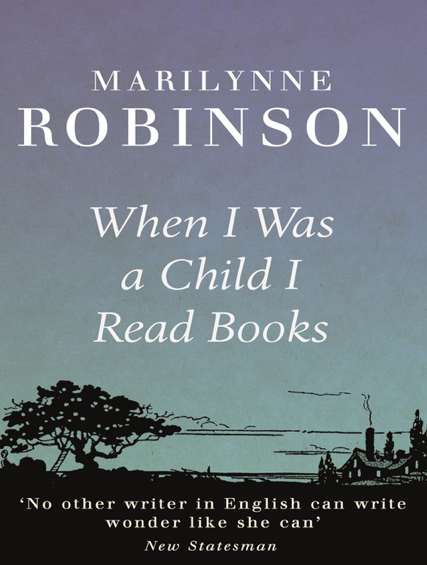This morning I saw that Al Mohler–a prominent spokesperson for what is called conservative evangelical and, most interestingly for the purposes of this discussion, Reformed, Christianity had shared a short piece in the National Review with the alarming subtitle:
“Schools see it as their job to make kids reject their parents’ conservative values.”
The author, Dennis Prager, is perhaps not known for moderation in his opinions, but I found the piece a fascinating example of exactly the kind of polarization in thinking that Marilynne Robinson describes in the introduction to her book The Death of Adam, a collection of essays that all
“assert, in one way or another, that the prevailing view of things can be assumed to be wrong, and that its opposite, being its image or shadow, can also be assumed to be wrong. They undertake to demonstrate that there are other ways of thinking, for which better arguments can be made.”
In the post, Prager pits equality against liberty, a “secular America” against a “God-centered one” and “multiculturalism” against a “unifying American identity.” His values–and those of his readers–are the older, more traditional values. He assumes that one either must regard America as
” ‘the last best hope of earth’ or else little more than an imperialist, racist, and xenophobic nation.”
It is notable that the article is titled “Conservative Parents, Left-Wing Children,” as if “liberal” were too kind a word to apply to these prodigals. Re-reading Robinson’s When I Was A Child I Read Books recently, I enjoyed her discussion of the term as it occurs in English Puritan translations of the Bible, and in Puritan thought more generally.
“in Renaissance French, liberal meant ‘generous,’ and of course the word occurs in the English Puritan translations, the Matthew’s Bible and the Geneva Bible, which were followed in their use of the term by the 1611 Authorized [King James] Version.”
Robinson, who is well-known as an admirer of John Calvin’s who just so happens to have read the man’s works carefully and extensively (perhaps exhaustively), argues that the concept of ‘liberality’ comes from Deuteronomy 15:13-14 and is “central to American social thought from its beginning.”
She quotes Calvin’s sermon on that text:
“If we thank God with our mouthes, confessing that it is he which hath blessed us, & in the mean while make none account of such as he has sent to doe us service in the increase of our living, by taking paynes and toyle for us; all our thanking of him is but lip-labor & utter hypocrisy.”
and again on the question of begging and provision for the apparently unworthy:
“if a man forbid begging, & therewithal doe no almes at all it is as much as if he did cut the throtes of those that are in necessitie. Nay, we must so provide for the poore, and redresse their want, that such as are stout beggars and apparently seeme not to be pitied may be reformed.“
We do this not because they are deserving, Calvin says, but because of the image of God in them. From Calvin’s Institutes:
“The Lord commands us to do ‘good unto all men,’ universally, a great part of whom, estimated according to their own merits, are very undeserving; but here the Scriptures assists us with an excellent rule, when it inculcates, that we must not regard the intrinsic merit of men, but must consider the image of God in them, to which we owe all possible honor and love.”
Robinson then shows how John Winthrop, in his famous address to the newly arrived Puritans in Massachussetts in 1630 (“A Modell of Christian Charity”) makes a similar argument for generosity, and how that man known little more than for one fiery sermon, Jonathan Edwards, made a similar case again, going further to insist that
“The proper objects of our liberality are not limited to ‘those of the same people and religion’ [yea, a plea for tolerance and multiculturalism from this "intolerant" Puritan father!?] because ‘our enemies, those that abuse us and injure us, are our neighbours, and therefore come under the rule of loving our neighbours as ourselves.”
Edwards, like Calvin and Winthrop, insist that there can be no exception or excuse to liberality. Edwards, in a most un-libertarian fashion, even says that relief provided “by the town” (of which he does not, apparently, disapprove) still does not excuse the Christian from her obligation. Here is Edwards:
“[I]t is too obvious to be denied, that there are in fact persons so in want, that it would be a charitable act in us to help them, notwithstanding all that is done by the town.“
Nor is there any sense that charity is only for those who are completely destitute:
“It does not answer to the rules of Christian charity to relieve only those who are reduced to extremity.”
Finally, Robinson again:
“There is clearly a feeling abroad [in that National Review piece!] that God smiled on our beginnings, and that we should return to them as we can. If we really did attempt to return to them, we would find Moses as well as Christ, Calvin, and his legions of intellectual heirs. And we would find a recurrent, passionate insistence on bounty or liberality, mercy and liberality, on being kind and liberal, liberal and bountiful…[t]hese phrases are all [Jonathan] Edwards’s and there are many more like them.”
So going back to where I started–that “Reformed” Christian leader’s recommendation of the piece that urges a return to “Judeo-Christian” and “traditional American” values, I can only paraphrase the inimitable Inigo Montoya from The Princess Bride:
“You keep using those words. I do not think they mean what you think they mean.”
And that probably goes for those who’d claim the label ‘liberal’ but who see religion–and especially Christianity and certainly people like John Calvin and Jonathan Edwards–as enemies of their cause. I suspect that the truth may be far less easily divided along ideological lines.

